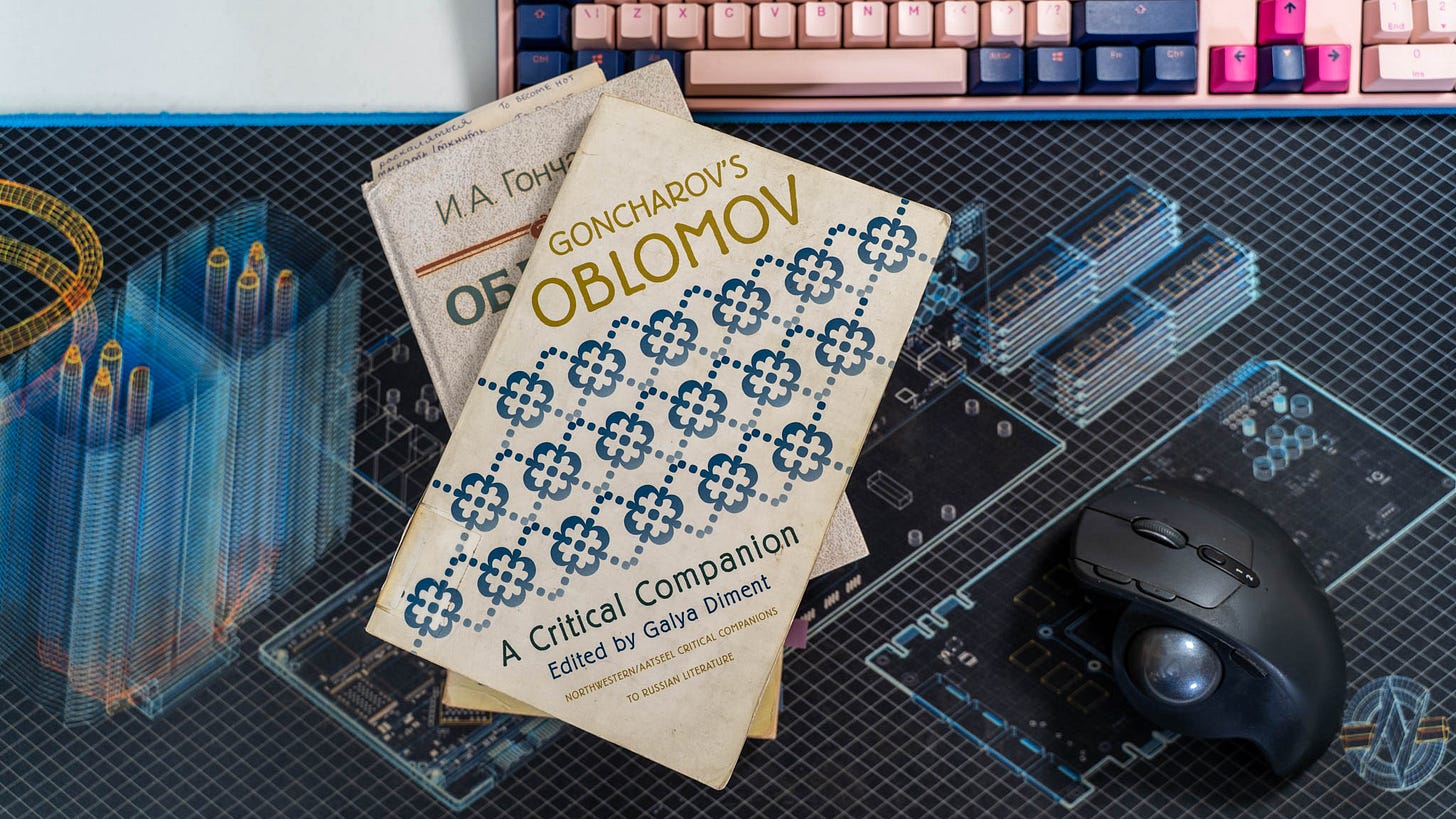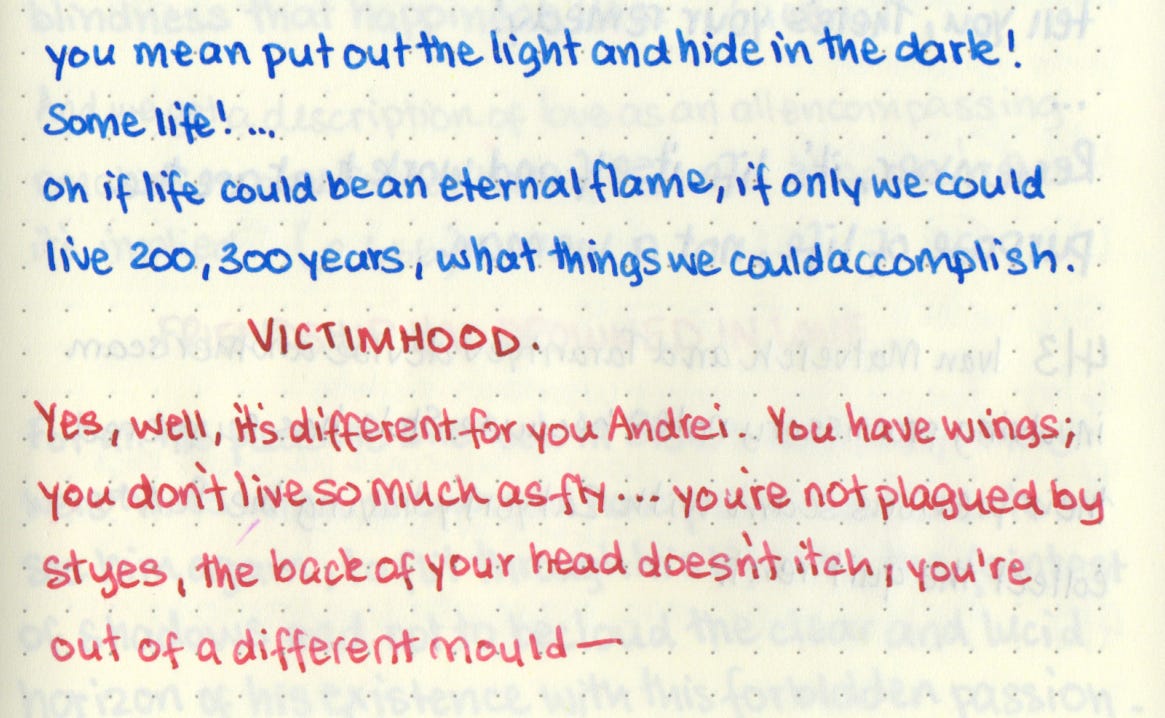Oblomov, Part Four and Wrap-up
'There's no remedy!' Or so Ilya tells Stolz. But is there?
I’m doing a final post on Part Four of the novel. For some reason I read it with minimal notes; I think it’s the ADHD in me, that as I see the finish line I have to make it as easy as possible to keep going. Can anyone relate to that? So, I read it and loved it. Is that what the kids mean with the phrase ‘no notes’? Ha ha.
I also finished Galya Diment’s essay collection, some of which was enjoyable and some not so much. I particularly enjoyed Goncharov’s letters at the end of the book.
The characters give me no respite, they pester me, pose for scenes. I hear fragments of their conversations — God help me, often it will seem to me that I am not making this up, but that it is all floating in the air around me and I need only look and listen carefully.
The first part of the novel, Oblomov’s Dream, was published ten years before the completed novel (1949 / 1959) and Goncharov wasn’t particularly happy with it or indeed with the whole of Part One.
The character of Stolz was criticised by many critics and, in his letters, Goncharov makes an effort to defend his choosing Stolz to be half-German. It’s really quite fascinating.
But I see it was not by chance that I happened upon a German. At the time (I’ve forgotten now) I must have been averse to the idea of using a pure German. So I took a Russified German, born in Russia but brought up without coddling, in the bracing and practical German manner.
I think Stolz makes an ideal foil for Oblomov and serves to highlight Oblomov’s malady by contrast.
Is Love a Disease?
We open Part Four with Ilya’s feelings for Agafya blossoming into love. It’s described in cosy terms—not the overwhelming passion he felt for Olga, but something more delicate and wholesome. At least that’s the vibe I get anyway.
Of course he kept hold of her elbows! Incidentally, I learned the words synecdoche and metonymy through reading the supplementary texts that go with this novel. Referring to Olga by her elbows (or Anisya by her nose) is an example of synecdoche, though some of the critics used metonymy so I admit that I got a bit confused. Anyway, I digress…
It just feels like a better match to me than Olga was. And likewise between Olga and Stolz.
Ilya and Stolz
Remember Stolz’s admonition to Ilya, Now or Never! This is Stolz’s last attempt at waking Ilya from his slumber and it’s clearly not going to work. The contrast between the two characters is laid out starkly here with these two paragraphs:
I’ll be honest, Ilya’s propensity to victimhood is something that I feel from time to time, and no amount of self-help books and podcasts can lift me up when the mist descends. Thankfully I have enough Stolz in me that I don’t slide right into the abyss. Without that, I wouldn’t be writing these words here right now. And I’m blessed to be in a wonderful marriage to a woman that supports me in all that I do. So while I relate wholly to Ilya, unlike characters in a book, there’s a bit of both in all of us and the ratio isn’t static.
Well, Ilya might be, but I’m certainly not! You see, the universality of literature! Isn’t it great?
Olga and Stolz
Chapter 4 is really quite moving. At first I was disenchanted at seeing a 31-page chapter without Ilya in it; it seemed a long time to dwell on two secondary characters. But it wasn’t long before I found myself being swept along in the narrative, as these two characters sound each other out and come out the other side as a couple.
We get a description of love as an all-encompassing emotion without a single mention of the word ‘disease’, although it is kind of implied.
While it’s a long chapter about secondary charactacters, it serves to balance the novel out in terms of the relationships. You can tell that Olga and Stolz are going to work well together, just as Ilya and Agafya are too.
He was especially gratified when the tiny grit she had absorbed from all his talk, his reading and his descriptions crystallized into a pearl that was deposited on the glittering seabed of her life.
Oedipus complex
The phenomenon of the Oedipus complex is raised in a few of the essays in Galya Diment’s collection. It refers back to Oblomov’s Dream, when we’re given a long chapter about Ilya’s childhood and the safety of Oblomovka. I’m not sure that I buy it though. Maybe he was cossetted too much and that led to his becoming risk averse and seeking solace in a motherly relationship. But what about all the years where it was just Ilya and Zakhar? Was it just that he wasn’t meeting anyone outside his flat? In his essay entitled Wombs, Tombs , and Mother Love: A Freudian Reading of Goncharov’s Oblomov, John Givens claims that Oblomov’s fascination with elbows arises from the fact that the crook of the elbow is the supporting point for a breast-feeding mother1. I don’t know—it feels like a stretch to me. But then it is an odd part of the body to have a fetish for.
I think for me the fetish for elbows has more to do with the their signifying the bustle of a busy kitchen. We’ve seen how important food is to Ilya throughout the novel, a point which is discussed in Ronald D. LeBlanc’s essay entitled Oblomov’s Consuming Passions: Food, Eating, and the Search for Communion. Food features heavily in the Oblomov’s Dream chapter, and towards the end of the novel we get scenes of Agafya’s pawning her jewellery in order to keep Ilya fed in the manner to which he’s accustomed. Then there’s the scene where he’s tucking into second-rate food with gusto when Stolz comes calling and declines the food offered to him.
Although I suppose it could be argued that the food motif goes back to the breast.
RIP Ilya Ilyich Oblomov
Ilya dies. He was warned, and it came to pass. Is it a fitting end to the novel? I think so. He was never going to grab the Now in place of the Never. But it does leave me feeling a bit hopeless and bereft. Or is it a warning to us all that untreated oblomovshchina will ultimately lead to an early death? That’s the message I’m taking from the ending anyway. Whether that treatment comes in the form of diet or exercise or being creative or volunteering or seeking a diagnosis and medication is up to the reader.
What’s your Now or Never?
What’s the one thing you’re avoiding that you really would like to get to?
Let me know in the comments!My Now or Never is to write a book, which is why I wrote that on the front of my fancy folio that contains my A4 notepads for my research.
Thank you!
This is my third reading of Oblomov and my first time reading Stephen Pearl’s translation. Making notes, writing articles and recording thoughts on video has made it such a rewarding experience for me, and I hope that you’ve got something out of what I’ve made. I hope to do something similar with another novel soon.
Video Review
Here’s my video review of the chapter, recorded right after reading it. You readers are getting these videos before my YouTube viewers and hopefully without ads. I say hopefully as I’ve not turned on ads for these videos until they’re public on YouTube, but I know that YouTube sometimes puts them in anyway.
Thanks for reading. I hope you’ve enjoyed this novel as much as I have. Let me know your thoughts in the comments!
“Agafya Matveyevna becomes for both Oblomov and the reader that part of the mother's anatomy from which nourishment and sensual pleasure is first derived, the place between the crook of the elbows cradling the child and holding it to the exposed breast that feeds it and the bare arms and shoulders that form the borders of the baby's world during feeding.”
Goncharov’s Oblomov: A Critical Companion, edited by Galya Diment, p99













